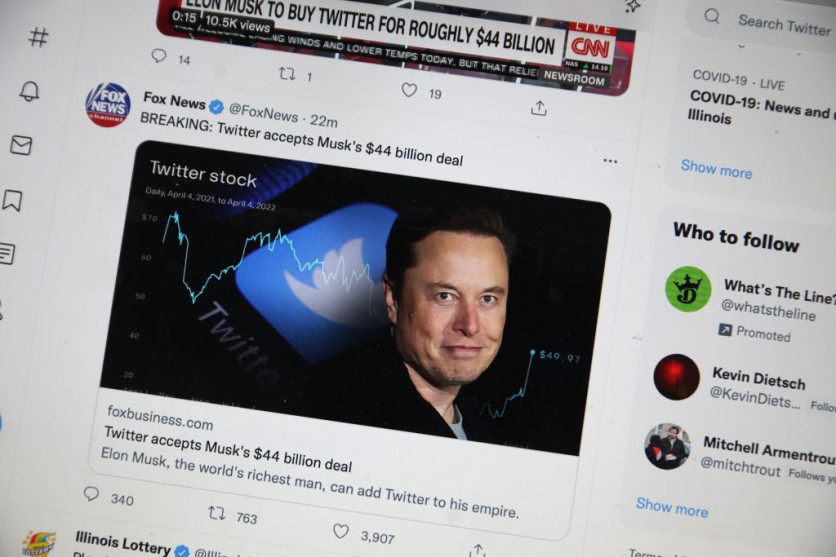There have been many issues raised after the richest person in the world, Elon Musk, acquired ownership over social media giant Twitter, such as his possible approaches to content moderation and his understanding of "free speech."
However, in a report by Tech Crunch, concerns about how Twitter's data access policy for research was raised by academic researchers.

In January last year, Twitter claimed that academic researchers were one of the largest groups using its API.
According to the social app, API is a "set of programmatic end points" where it allows the user to "find and retrieve," interact with, or come up with various resources, including tweets, users, spaces, direct messages, and many more.
Several researchers are worried that Musk does not resonate with the same commitment to open data access, citing how the billionaire himself has shown vitriol in the past, saying that his business ventures were reported in a bad light.
Read Also : Elon Musk's Twitter Plan To Charge Companies for Embedded Tweets | Shares Opinion About Far-Left People
"Twitter's Challenges and Deficiencies"
In a statement with Tech Crunch, Mor Naaman, professor of information science at Cornell Tech and has worked with Twitter data since 2009, said that Musk's era on Twitter could spell out hostility toward researchers exposing Twitter's "challenges and deficiencies."
She said, "I am pessimistic that Twitter will continue to strive for accountability as a privately held company under Musk."
"I do not believe research like we have done on [former President Donald Trump's] Stop the Steal campaign - and the data we collected from Twitter and made available to other researchers, used in 12 different papers since last year - would be allowed to happen under Musk. Second, I cannot imagine internal teams that scrutinize the ethics and bias of the company's systems will continue to function well, let alone publish their findings publicly." she added.
Naaman believes that publications like the one that they have published will face a harder challenge in overcoming the existing suspicion that there is a corporate-bias nature of platforms whenever they publish their own research papers.
Meanwhile, a research scientist for the Center for Social Media and Politics at NYU named Megan Allison Brown, agreed with Naaman's pessimism.
She alleged that Musk has a history of "blocking critics' and "reducing transparency" at other companies he headed, such as Tesla. She also said that academics could "potentially be blocked" from using the platform's API if their research is critical of the platform.
Musk actually promised to build a website that will rate the "core truth" of articles written about accidents with Tesla cars, Tesla labor issues, and his connection with Wall Street. However, he did not push through with the website.
"Taking down Spam Bots"
One of the highlighted promises of Musk when he took over Twitter was taking down spam bots, or malicious accounts that spread misinformation and scams.
However, Orestis Papakyriakopoulos, a postdoctoral researcher at the MIT Media Lab, noted in a report by Tech Crunch that not all bots are harmful.
He gave an example on how researchers have used automated accounts to study if shifting people's attention to accuracy has the likelihood of increasing the quality of the news they share on Twitter.
He also noted, that there is no certainty on how Musk's acquisition will affect open data access since the billionaire's statements have largely revolved on data collection.
"Of course, removing automated accounts will reduce the ability of researchers to perform field experiments on the platform. But honestly, automated activity through APIs is important for commercial and news agencies, so I do not believe that this is an action that will be done in the end," the researcher said.
Open Tradition
Stevie Chancellor, a researcher who specializes in the mental health impacts of social media and an assistant professor at the University of Minnesota, said that Twitter's API has been key in understanding the effects of issues such as "misinformation and polarization."
He underscored that API is a crucial component of research for academics who are specializing in the field of social media studies.
MIT management science professor David G. Rand is hopeful that this open tradition will still continue with Musk's ownership of the bird app.
"Thus far, Twitter has been unique among the major platforms in how available they have made data for researchers (and anyone outside academia, for that matter). Almost all tweets are publicly available, APIs make it easy to download large amounts of data." Rand said in a statement with Tech Crunch.
Related Article : Twitter Employees in Singapore Concerned About Stock Options, Compensations Amid Elon Musk Takeover
This article is owned by Tech Times
Written by Joaquin Victor Tacla
ⓒ 2026 TECHTIMES.com All rights reserved. Do not reproduce without permission.




